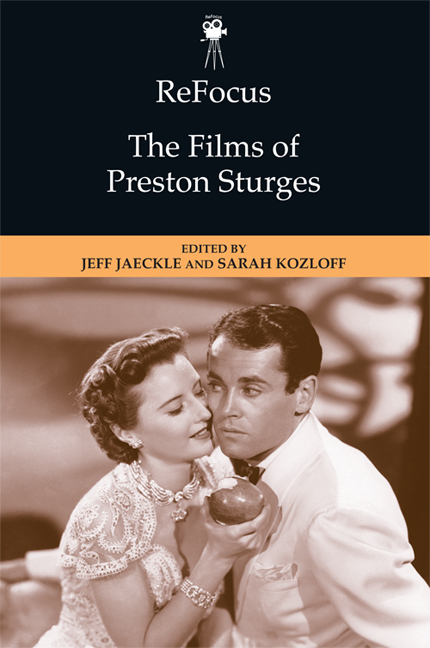Book contents
- Frontmatter
- Contents
- List of Figures
- Notes on Contributors
- Introduction: An Agile Mind—The Many Stands of Preston Sturges
- Part 1 Contexts: Genre, Studio, Authorship
- Part 2 Cultural Commentary: History and Identity
- Part 3 Technique: Scripting, Performance, Music
- 9 The Unheard Song of Joy
- 10 The Eye of the Storm: Preston Sturges and Performance
- 11 Presto(n) con Spirito: Comedies with Music, Sturges-style
- Part 4 Impact: Reception/Reputation
- Index
10 - The Eye of the Storm: Preston Sturges and Performance
from Part 3 - Technique: Scripting, Performance, Music
Published online by Cambridge University Press: 05 September 2016
- Frontmatter
- Contents
- List of Figures
- Notes on Contributors
- Introduction: An Agile Mind—The Many Stands of Preston Sturges
- Part 1 Contexts: Genre, Studio, Authorship
- Part 2 Cultural Commentary: History and Identity
- Part 3 Technique: Scripting, Performance, Music
- 9 The Unheard Song of Joy
- 10 The Eye of the Storm: Preston Sturges and Performance
- 11 Presto(n) con Spirito: Comedies with Music, Sturges-style
- Part 4 Impact: Reception/Reputation
- Index
Summary
Preston Sturges has received numerous accolades for his writing and directing, but much less acknowledgment for the superb acting on display in his films. In fact, an electronic and hard copy search turned up no articles devoted solely to analysis of acting in Sturges's films, though diverse comments on individual actors’ performances are peppered throughout books on individual stars and genres. In fairness, Richard Dyer and James Naremore (1979 and 1988, respectively), among others, contributed significantly to scholarship on stardom and on acting; but over the past decade, in film study as a whole, performance remains an area still relatively under-examined. As Paul McDonald observes, this is particularly regrettable since “examination of acting has a vital role to play [in] … considering how the signification of the actor's voice and body contribute to a film's meaning.”
Given Sturges's character-driven stories and the performative role-playing by characters within many of his films, analysis of the acting proves both richly deserved and profoundly intriguing. I will argue that the sustained, exceptional acting is in fact the key element in creating the dynamic appeal of his work, earning his scripts the esteem they merit. To this end, Sturges often cast major stars of the studio system in his films. But while “stardom” is fertile ground for further interrogation of all it entails, for the purposes of this essay use of the term “acting” will follow James Naremore's definition that designates “a special type of theatrical performance in which the persons held up for show have become agents in a narrative.” Also assumed is that acting involves a “mastery, skill, or inventiveness that is implied in the normative use of the word performance.” In addition, in agreement with Andrew Klevan, I will treat performance as one element in the totality of film style and explore “the achievement of expressive rapport.”
This more inclusive analysis of acting includes “the relationship of the performer to the camera” and the composition of the shot, as well as all aspects of art direction. As Cynthia Baron and Sharon Marie Carnicke explain, “[W]here actors’ work is treated as a primary cinematic element, human movements and interactions often provide the basis for a film's visual and aural design … Such films use lighting, setting, costuming, camera movement, framing, editing, music, and sound to give audiences privileged views of characters’ inner experiences.”
- Type
- Chapter
- Information
- ReFocus: The Films of Preston Sturges , pp. 211 - 231Publisher: Edinburgh University PressPrint publication year: 2015



